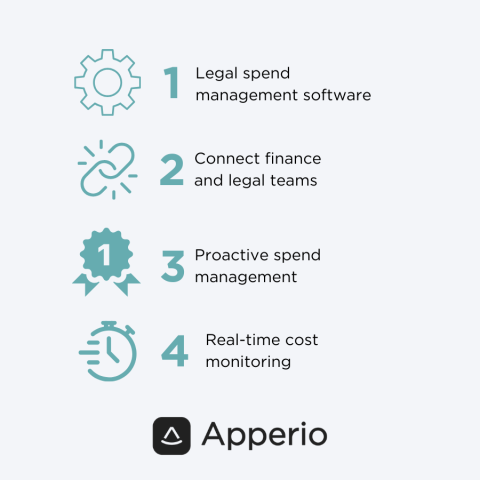The intersection of legal and financial strategy: Insights for the modern CFO

The role of CFOs in private equity firms has undergone a quiet yet profound shift. While still focused on overseeing finances and performance, CFOs now find themselves at the intersection of financial and legal strategy.
Why? Because there’s a major discrepancy over who is responsible for managing certain legal costs—costs that typically involve deal, legal, and finance teams.
As a result, CFOs must now approach legal considerations with the same strategic eye applied to financial decisions. This maintains business health and supports compliance—like with the new SEC rule changes. After all, legal expenses, unpredictable yet indispensable, can erode profit margins if not managed with strategic foresight. That’s why the modern CFO's role is expanding to include legal spend management.
While it may sound straightforward, there are challenges. So, in this blog, we’re unpicking the problems and delving into strategies to bridge the gap between finance and legal—to fully gain control of legal spend management.
Let’s dive in. 👇
Legal spend management challenges for CFOs
Now, adding legal spend management to CFOs' rosters is easier said than done. Those who have already taken on legal costs will know there are real challenges:
- Lack of visibility into legal expenses, severely hampering oversight.
Without clear and real-time insights into spend, managing costs is exceedingly difficult. Murky visibility may stem from decentralized decision-making, law firms' varying billing practices, or simply missing a way to track expenses adequately. - Volatility of legal costs adds complexity.
Litigation surges, regulatory shifts, or transactional needs can create unexpected legal demands. This unpredictability makes accurately forecasting legal spend markedly difficult, further complicating financial planning and risk mitigation initiatives. - Difficulty in budgeting for legal services.
Traditional budgeting methods often fall short when applied to legal spend due to the variable nature. This can lead to budget overruns and financial strain, especially when unexpected legal issues arise. - Inability to do reporting quickly and accurately.
CFO’s are under increasing pressure from both internal leadership and external regulation (like the recent SEC’s Private Funds rules). Both demand accurate total spend liabilities and forecasts on accruals in shorter and shorter time frames.
These challenges extend beyond just managing legal expenses; they can cascade through the entire financial strategy, influencing firm-wide performance. The inability to accurately forecast and control legal spend can strain margins, skew financial projections, and leach resources from strategic initiatives.
Fundamentally, mastering legal spend management underpins stability in the best times—but even more so amidst economic uncertainty. But that’s about to change.
4 strategies for confidence in legal spend management
So what’s the answer then? Well, CFOs of leading private equity firms are following these best practices to overcome these issues and gain control of costs. 👇
1. Implement legal spend management software 📊
Specifically, advanced legal spend analytics software offers a game-changing suite of capabilities designed to give firms a handle on legal costs. Here’s why:
Comprehensive spend analysis, accurate budget forecasting, variance tracking and real-time reporting. This technology enables complete visibility—not just tallying external legal fees and invoices, also combining tax and advisory spend, which enables decoding of exactly how each Pound or Dollar is spent.
Scrutinizes data to reveal spending patterns and cost drivers. With this, CFOs can pinpoint savings opportunities, negotiate preferable rates with outside counsel, model the financial impact of case strategies and support resourcing decisions aligned with strategic priorities. The granularity also facilitates benchmarking, scenario planning and contingency modeling to stress test different strategies.
Automated legal spend analytics deliver real-time visibility into budget variance tracking. This works at both the matter, deal, fund, and house department levels. This means CFOs can mitigate overruns through prompt intervention, while confirming alignment of every case and activity to core financial goals.
Combined, holistic insights, advanced guardrails, and greater visibility form a powerful foundation for long-term strategy.
2. Bridge the gap between finance and legal 🛑
For private equity firms to get a handle on costs and make greater decisions, finance and legal have to collaborate. The key to this comes down to creating open, regular communication to enhance teamwork.
In fact, CFOs can take the lead in breaking down silos and creating a culture of collaboration. Because when finance and legal teams share insights and challenges, they more closely align on effective management of legal expenses, and overall strategies. For example, regular meetings to cover budgets, upcoming legal matters, and their potential financial effects.
💡Top tip: Detail-oriented data-led conversations about timelines, risks, and costs enable more accurate forecasting and resource allocation, preventing financial surprises.
Ultimately, this supports better legal spend management through transparency and combined strategic decision-making. But beyond that, it improves other factors like risk management.
3. Implement proactive legal spend management 🥇
Rather than reacting to costs, anticipating legal needs allows for tighter budgeting, risk planning, and resource alignment—enhancing efficiency firm-wide.
Here’s how:
- Data insights: Incorporate legal insights into strategy early. Consult teams to forecast requirements amidst transactions, litigation, or regulatory shifts. Integrating legal costs upfront grounds financial plans in reality.
- Budgeting: Develop detailed legal budgets with contingencies. Clear budgets help avoid overspending and enable better spend management.
- Tech adoption: Use legal spend management software for real-time analytics and trend spotting, for more data-driven decisions and budget adjustments.
- Compliance management: Adhere to the SEC’s new rules by tracking expenses in one place for more rigorous tracking, analysis, reporting, and disclosure of detailed investor-level data.
- External counsel: Build strong connections with outside counsel for cost efficiency and responsiveness. Remain collaborative and in a model of partnership.
To sum up, a proactive legal spend stance allows CFOs to navigate challenges smoothly, tightly integrating legal within the broader financial strategy for optimal health.
4. Use real-time cost monitoring ⏱
By monitoring legal costs as they occur, CFOs gain immediate insight into legal expense patterns so that they can identify cost reductions, enhanced processes, and better negotiation leverage. To achieve this, CFOs leverage legal spend management software.
Why? Because legal spend management software provides efficient data collection and packages insights into an easy-to-digest dashboard, making it quick to spot issues. As it’s one platform for tracking expenses, both legal and finance teams can gain a thorough understanding of costs and work together to manage them better.
This means CFOs can then work on achieving more favorable terms with external counsel, streamlining operations, and maximizing the return on legal investments.
The bottom line? This approach elevates financial oversight to strategic management, transforming routine checks into opportunities for growth.

Transforming legal spend into strategic advantage
As we've seen, CFOs now face complex challenges as financial and legal responsibilities cross over—such as lack of visibility into legal expenses to the unpredictability and difficulty in budgeting for legal services.
To help overcome this, we’ve covered four key strategies, including using real-time legal spend trackers that create clarity for tighter budgets and forecasting. Together, these tools can strengthen financial health, ensure regulatory compliance, and drive higher returns on legal investments.
Ultimately, by embracing these practices, CFOs can enhance their firm's financial health, ensure compliance with evolving regulations like the SEC rule changes, and drive greater ROI from legal investments.
Looking to gain control of legal spend management? See how Apperio’s platform creates one single view of legal spend. Book a live demo here.
Keen to learn more first? Read our latest blogs: